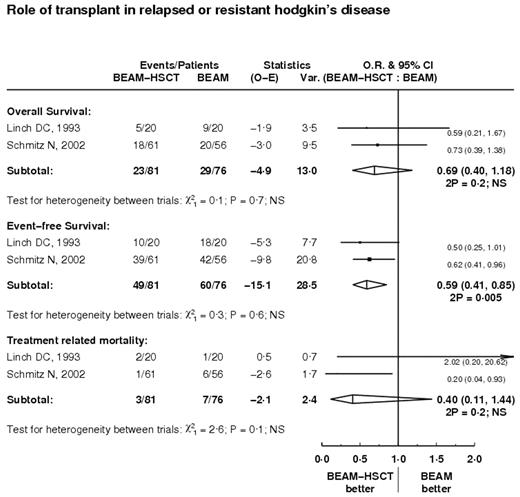Abstract
Background: Hodgkin disease (HD) is a potentially curable lymphoma with overall survival exceeding 60% at 10 years. However, patients with relapsed Hodgkin’s disease have a dismal prognosis when treated with conventional salvage chemotherapy. The primary objective of our systematic review/meta-analysis was to evaluate the efficacy of high-dose chemotherapy and autologous stem-cell transplant (HSCT) versus conventional chemotherapy in patients with relapsed Hodgkin’s disease which has not been done before.
Methods: Data search of published studies included Medline (1966–2006), Cochrane library and hand search of references. Studies were included if they were randomized controlled trials of HSCT versus conventional chemotherapy only. Data were extracted on benefits as well as harms (overall survival, event-free survival, and treatment related mortality). All data extraction was done in duplicate independently.
Results: Out of 47 identified studies only 2 met the inclusion criteria of the current systematic review. Overall survival was similar for HSCT and conventional chemotherapy arms (see figure 1) with a pooled hazard ratio (HR) of 0.69 (95%CI 0.40, 1.18, p=0.2). However, the event-free survival was better in the HSCT arm than the conventional chemotherapy alone group (HR = 0.59, 95%CI 0.41, 0.85, p=0.005). Treatment related mortality was similar in both groups. (HR = 0.40, 95%CI 0.11, 1.44, p=0.2).
Conclusion: Results from our meta-analysis indicate that treatment with HSCT compared with conventional chemotherapy only improves event free survival without excessive toxicity. However, overall survival was not affected by the HSCT therapy. In summary patients with relapsed Hodgkin’s disease should be offered HSCT therapy.
Role of transplant in relapsed or resistant hodgkin’s disease
Disclosure: No relevant conflicts of interest to declare.
Author notes
Corresponding author


This feature is available to Subscribers Only
Sign In or Create an Account Close Modal